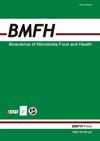日本老年人肠道微生物稳定性:来自Mykinso队列的见解
IF 2.9
4区 医学
Q2 Agricultural and Biological Sciences
引用次数: 0
摘要
肠道菌群失衡在多种疾病的发病机制中起着重要作用。在这里,我们确定了具有不同体重指数(bmi)和肠型的日本人群中微生物-微生物相互作用和肠道微生物组稳定性。利用16S核糖体RNA基因测序,我们分析了来自3365名日本老年人粪便样本的肠道微生物数据。这些人根据他们的bmi被分为瘦组、正常组和肥胖组。根据他们的肠道微生物群肠型进一步分类:拟杆菌(肠型B),普雷沃氏菌(肠型P)和鲁米诺球菌(肠型R)。我们使用Mykinso肠道微生物组测试服务评估的调查问卷获得了不同宿主因素的数据,如年龄,BMI和疾病状况。随后,我们对共现网络进行了评估。BMI的个体差异与共现网络的差异有关。通过对基于BMI状态的网络拓扑进行探索,我们发现瘦组的网络密度低于正常组。此外,基于模拟的稳定性分析显示,精益组的阻力指数低于其他两组。我们的研究结果提供了对各种微生物-微生物相互作用和肠道微生物稳定性的见解,并有助于制定针对肠道微生物群调节的适当治疗策略来管理虚弱。本文章由计算机程序翻译,如有差异,请以英文原文为准。
Gut microbial stability in older Japanese populations: insights from the Mykinso cohort
Gut microbiota imbalance plays an important role in the pathogenesis of various diseases. Here, we determined microbe–microbe interactions and gut microbiome stability in a Japanese population with varying body mass indices (BMIs) and enterotypes. Using 16S ribosomal RNA gene sequencing, we analyzed gut microbial data from fecal samples obtained from 3,365 older Japanese individuals. The individuals were divided into lean, normal, and obese groups based on their BMIs. They were further categorized according to their gut microbiota enterotypes: Bacteroides (enterotype B), Prevotella (enterotype P), and Ruminococcus (enterotype R). We obtained data on different host factors, such as age, BMI, and disease status, using a survey questionnaire evaluated by the Mykinso gut microbiome testing service. Subsequently, we evaluated the co-occurrence network. Individual differences in BMI were associated with differences in co-occurrence networks. By exploring the network topology based on BMI status , we observed that the network density was lower in the lean group than that in the normal group. Furthermore, a simulation-based stability analysis revealed a lower resistance index in the lean group than those in the other two groups. Our results provide insights into various microbe–microbe interactions and gut microbial stability and could aid in developing appropriate therapeutic strategies targeting gut microbiota modulation to manage frailty.
求助全文
通过发布文献求助,成功后即可免费获取论文全文。
去求助
来源期刊

Bioscience of Microbiota, Food and Health
Immunology and Microbiology-Applied Microbiology and Biotechnology
CiteScore
5.50
自引率
3.20%
发文量
24
期刊介绍:
Bioscience of Microbiota, Food and Health (BMFH) is a peer-reviewed scientific journal with a specific area of focus: intestinal microbiota of human and animals, lactic acid bacteria (LAB) and food immunology and food function. BMFH contains Full papers, Notes, Reviews and Letters to the editor in all areas dealing with intestinal microbiota, LAB and food immunology and food function. BMFH takes a multidisciplinary approach and focuses on a broad spectrum of issues.
 求助内容:
求助内容: 应助结果提醒方式:
应助结果提醒方式:


